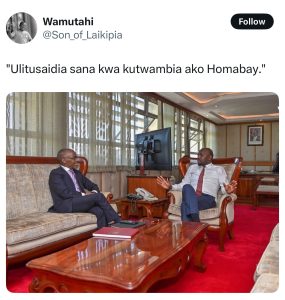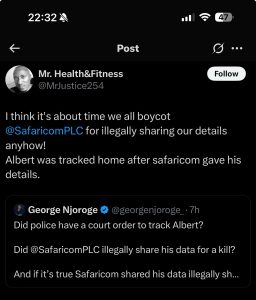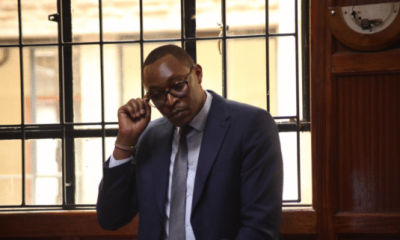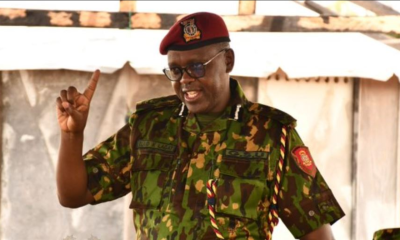News
Death of Albert Ojwang’ in Police Custody Reignites Debate Over Safaricom’s Role in State Surveillance
Activists have accused Safaricom of sharing customer call records and location data with alleged state agents, allowing them to track and capture targets.
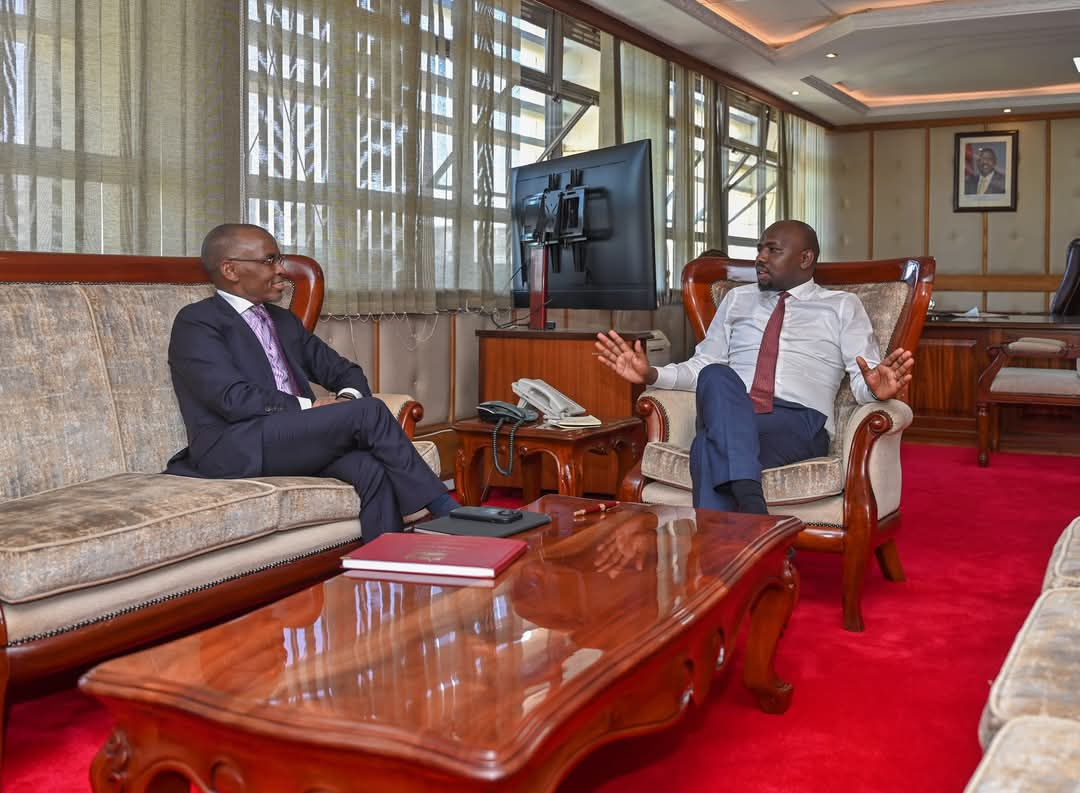
A viral social media post has renewed accusations that Kenya’s telecommunications giant Safaricom aids state surveillance, as the nation grapples with the controversial custodial death of Albert Ojwang, a 31-year-old teacher whose post-mortem has exposed what appears to be a police cover-up involving torture and extra-judicial killing.
The Allegations That Led to Arrest
Speaking before the Senate on Wednesday, June 11, 2025, Inspector General Douglas Kanja revealed the specific social media posts that triggered Ojwang’s arrest.
According to Kanja, Ojwang had posted on X alleging that Deputy Inspector General Eliud Lagat was involved in corruption within the National Police Service.
“Specifically, the published post alleged that Eliud Lagat had strategically placed his most trusted officer in charge of DCI desks, occurrence books, and traffic shifts to control revenue streams and intelligence flow,” Kanja stated.
Another post depicted Lagat alongside Joseph Chirchir, a senior officer in the Nairobi area, under the caption “EACC investigating top cop after purchase of Ksh335.9 million home in Dubai,” accompanied by Lagat’s photograph and the phrase “Eliud Lagat Mafia police.”
The posts were deemed defamatory and unsubstantiated, prompting investigation under the Computer Misuse and Cybercrime Act 2018.
To verify the claims, investigating officers wrote to the Ethics and Anti-Corruption Commission (EACC), which confirmed that Lagat was not under investigation, contradicting the social media allegations.
Digital Trail and CAK Involvement
Critically, the investigation involved the Communications Authority of Kenya (CAK), which provided registration details and preserved posts associated with Ojwang’s X account handle @pixelpioneer.
The CAK confirmed the social media accounts were linked to the suspects, enabling their identification and subsequent arrest.
This revelation adds weight to longstanding allegations that telecommunications authorities routinely assist security agencies in tracking social media users, raising questions about digital privacy protections for Kenyan citizens expressing dissent online.
The Death and Investigation
Ojwang, a teacher and blogger based in Voi, was arrested on June 7, 2025, at his homestead in Homa Bay by a DCI team that had traveled from Nairobi.
According to IG Kanja’s Senate testimony, the arrest followed a cybercrime investigation that began after Kevin Moinde, another suspect arrested earlier, disclosed Ojwang’s involvement in the allegedly defamatory posts.
The official police account states that after his arrest, Ojwang was transferred to Nairobi Central Police Station, arriving at approximately 9:17 PM. At 9:24 PM, he contacted his wife to inform her of his safe arrival.
He was booked into cells at 9:35 PM after officers confirmed his “normal physical and mental state.”
However, in the early morning of June 8, officers conducting a routine visit found Ojwang unconscious in his cell.
He was rushed to Mbagathi Hospital at 1:39 AM but was declared dead on arrival.
A post-mortem examination conducted on Tuesday revealed a starkly different picture, directly contradicting the police account.
The autopsy, carried out by a team of pathologists including Dr. Njoroge, Dr. Oduor, Dr. Mutuma, and Dr. Ndegwa, unanimously concluded that the cause of death was blunt force trauma.
The findings included head injuries with internal bleeding, features of neck pressure suggestive of compression or strangulation, and multiple superficial injuries on the upper and lower lips.
Lead pathologist Dr. Bernard Midia stated that the injuries were consistent with external assault and showed signs of struggle, making self-inflicted injury unlikely.
Law Society of Kenya (LSK) President Faith Odhiambo described the injuries as consistent with torture, accusing the perpetrators of extra-judicial execution.
“This is a crime unknown to law. Someone gave the order to pick him up from Homa Bay. Someone must be held accountable,” said Odhiambo, demanding that IPOA act decisively.
In a heart-wrenching plea at the post-mortem press conference, Ojwang’s father Meshack directly addressed Deputy Inspector General Lagat: “Eliud Lagat, were you the one who sent your people? What did he do to deserve this? Why was my child crucified?” He called on President William Ruto to intervene, saying, “Help me as a taxpayer. They saw our home was humble and assumed we didn’t matter.”
Following the death, IG Kanja interdicted several officers including the officer commanding Central Police Station, the officer on duty that night, the cell sentry, and all officers who were on duty at the report office. The Independent Policing Oversight Authority (IPOA) has launched an investigation with the post-mortem findings intensifying calls for accountability.
Renewed Safaricom Allegations
Beyond the CAK’s confirmed role in the investigation, a separate viral X post has reignited longstanding allegations that Kenya’s largest telecommunications provider shares customer location data with security agencies to facilitate arrests and abductions.
The controversy erupted following a post on X by user @Son_of_Laikipia on June 9, which appeared to credit Safaricom with helping police locate Ojwang in Homa Bay.
The post, accompanied by an image purportedly showing a meeting between Safaricom and police officials, has renewed accusations of the telecom giant’s complicity in state surveillance.
Activists have accused Safaricom of sharing customer call records and location data with alleged state agents, allowing them to track and capture targets.
These allegations have persisted since mid-2024, when Safaricom faced backlash during widespread Gen Z-led protests, with accusations of facilitating abductions by allegedly handing over user data.
During a Senate session in November 2024, Senator Okiya Omtatah stated: “Safaricom is accused of aiding state agents in tracking and abducting citizens, yet no response has been given”.
Investigative reports have detailed how suspects located using mobile phone signals can be abducted without due judicial process.
Company Response and Legal Framework
Safaricom has consistently denied sharing customer data without proper legal authorization. The company has previously stated it does not share customer data with security agencies without following proper legal procedures.
However, investigations have revealed that Kenyan security agencies have had almost unrestricted access to mobile phone users’ call data records and location data through a data management system. Under the Kenya Information and Communications Act, telecommunications companies face financial penalties of up to Sh1 million for privacy violations, while staff risk jail terms of up to five years.
Public Response and Implications
The latest controversy has prompted some social media users to call for boycotts of Safaricom services, while others have tagged CEO Peter Ndegwa demanding accountability.
The debate is complicated by Safaricom’s central role in Kenya’s economy—its M-Pesa mobile money platform handles transactions worth over half of the country’s GDP, making it difficult for many Kenyans to avoid the service entirely.
Human rights organizations have accused Safaricom of “habitually declining to provide full CDRs despite court orders” and allowing security agencies “routine access to consumer data”.
The allegations against Safaricom occur against a backdrop of reported increases in enforced disappearances and abductions in Kenya, particularly targeting government critics and activists.
While President William Ruto’s administration has denied state involvement in such incidents, human rights groups continue to document cases and call for accountability.
The controversy highlights ongoing tensions between national security imperatives and digital privacy rights in Kenya, where telecommunications data has become a critical tool for law enforcement—and allegedly, for suppressing dissent.
As the IPOA investigation into Ojwang’s death continues, the incident has intensified calls for stricter regulations governing how telecommunications companies handle customer data and cooperate with security agencies. The case underscores broader questions about the balance between state security and citizen privacy in Kenya’s digital age.
Key Facts:
– Albert Ojwang, 31, a teacher and blogger from Voi, died in police custody at Nairobi Central Police Station on June 8, 2025
– He was arrested on June 7 in Homa Bay over X posts alleging Deputy Inspector General Eliud Lagat was involved in police corruption
– Posts claimed Lagat had “strategically placed trusted officers to control revenue streams” and was under EACC investigation (later confirmed false)
– Communications Authority of Kenya (CAK) provided registration details linking Ojwang to the social media accounts
– Post-mortem revealed blunt force trauma, head injuries, neck compression, and multiple facial injuries, contradicting police claims
– Pathologists unanimously concluded death was caused by assault, not self-inflicted injury
– IG Kanja interdicted multiple officers at Central Police Station following the death
– IPOA has launched investigation; viral social media post has renewed allegations about Safaricom’s role in state surveillance
Kenya Insights allows guest blogging, if you want to be published on Kenya’s most authoritative and accurate blog, have an expose, news TIPS, story angles, human interest stories, drop us an email on [email protected] or via Telegram
-

 Business1 week ago
Business1 week agobetPawa Empire Crumbles: Mr Eazi’s Betting Gambit Unravels Amid Partner’s Shadowy Deals
-

 News6 days ago
News6 days agoDCI Probes Meridian Equator Hospital After Botched Procedure That Killed a Lawyer
-

 Business6 days ago
Business6 days agoMinnesota Fraud, Rice Saga, Medical Equipment Deal: Why BBS Mall Owner Abdiweli Hassan is Becoming The Face of Controversial Somali Businessman in Nairobi
-

 Business1 week ago
Business1 week agoKRA Boss Humphrey Watanga In Big Trouble In Sh5.5 Billion Rice Import Scandal
-

 Investigations2 weeks ago
Investigations2 weeks agoKERRA Homa Bay Region Manager Calvince Thomas Accused of Swindling Businessman Ksh 2 Million in Phantom Tender Deal
-

 Politics6 days ago
Politics6 days agoYour Excellency! How Ida’s New Job Title From Ruto’s Envoy Job Is Likely to Impact Luo Politics Post Raila
-

 Business1 week ago
Business1 week agoState Set to Demolish Pastor Ng’ang’a’s Church in Sh28 Billion Railway City Push
-

 Business1 week ago
Business1 week agoControversial Turkish Firm Celebi Canceled in India Over Security Concerns Acquires Strategic Property in Nairobi’s Main Airport

